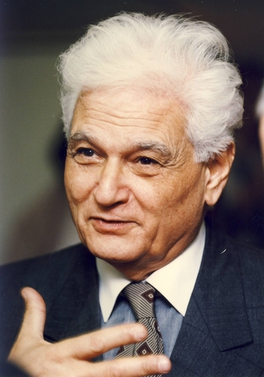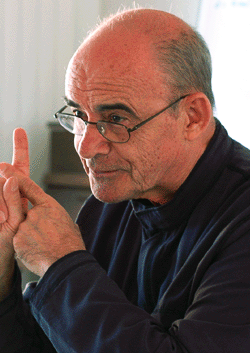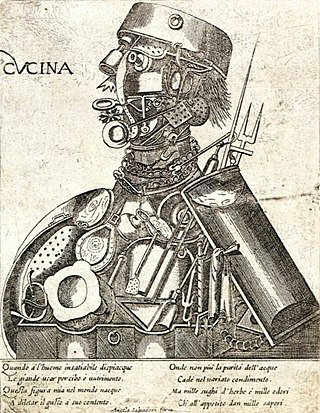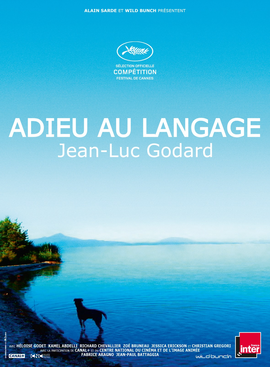
Posthumanism or post-humanism is an idea in continental philosophy and critical theory responding to the presence of anthropocentrism in 21st-century thought. It encompasses a wide variety of branches, including:
- Antihumanism: a branch of theory that is critical of traditional humanism and traditional ideas about the human condition, vitality and agency.
- Cultural posthumanism: a branch of cultural theory critical of the foundational assumptions of humanism and its legacy that examines and questions the historical notions of "human" and "human nature", often challenging typical notions of human subjectivity and embodiment and strives to move beyond archaic concepts of "human nature" to develop ones which constantly adapt to contemporary technoscientific knowledge.
- Philosophical posthumanism: a philosophical direction that draws on cultural posthumanism, the philosophical strand examines the ethical implications of expanding the circle of moral concern and extending subjectivities beyond the human species.
- Posthuman condition: the deconstruction of the human condition by critical theorists.
- Posthuman transhumanism: a transhuman ideology and movement which, drawing from posthumanist philosophy, seeks to develop and make available technologies that enable immortality and greatly enhance human intellectual, physical, and psychological capacities in order to achieve a "posthuman future".
- AI takeover: A variant of transhumanism in which humans will not be enhanced, but rather eventually replaced by artificial intelligences. Some philosophers and theorists, including Nick Land, promote the view that humans should embrace and accept their eventual demise as a consequence of a technological singularity. This is related to the view of "cosmism", which supports the building of strong artificial intelligence even if it may entail the end of humanity, as in their view it "would be a cosmic tragedy if humanity freezes evolution at the puny human level".
- The Merge Hypothesis : Futurologism, a variant of Transhumanism in which humans and AI will merge to create a new post human species, with AI absorbing elements of humanity such as creativity, empathy, and social cohesion, and humanity being enhanced by AI to achieve new feats.
- Voluntary Human Extinction, which seeks a "posthuman future" that in this case is a future without humans.

Martin Heidegger was a German philosopher who is best known for contributions to phenomenology, hermeneutics, and existentialism. He is often considered to be among the most important and influential philosophers of the 20th century. He has been widely criticized for supporting the Nazi Party after his election as rector at the University of Freiburg in 1933, and there has been controversy about the relationship between his philosophy and Nazism.

Jacques Derrida was an Algerian-born French philosopher. He developed the philosophy of deconstruction, which he utilized in numerous texts, and which was developed through close readings of the linguistics of Ferdinand de Saussure and Husserlian and Heideggerian phenomenology. He is one of the major figures associated with post-structuralism and postmodern philosophy although he distanced himself from post-structuralism and disowned the word "postmodernity".

Jean-Luc Godard was a Franco-Swiss film director, screenwriter, and film critic. He rose to prominence as a pioneer of the French New Wave film movement of the 1960s, alongside such filmmakers as François Truffaut, Agnès Varda, Éric Rohmer, and Jacques Demy. He was arguably the most influential French filmmaker of the post-war era. According to AllMovie, his work "revolutionized the motion picture form" through its experimentation with narrative, continuity, sound, and camerawork. His most acclaimed films include Breathless (1960), Vivre sa vie (1962), Contempt (1963), Band of Outsiders (1964), Alphaville (1965), Pierrot le Fou (1965), Masculin Féminin (1966), Weekend (1967), and Goodbye to Language (2014).

Emmanuel Levinas was a French philosopher of Lithuanian Jewish ancestry who is known for his work within Jewish philosophy, existentialism, and phenomenology, focusing on the relationship of ethics to metaphysics and ontology.

Donna J. Haraway is an American professor emerita in the history of consciousness and feminist studies departments at the University of California, Santa Cruz, and a prominent scholar in the field of science and technology studies. She has also contributed to the intersection of information technology and feminist theory, and is a leading scholar in contemporary ecofeminism. Her work criticizes anthropocentrism, emphasizes the self-organizing powers of nonhuman processes, and explores dissonant relations between those processes and cultural practices, rethinking sources of ethics.
Amorality is an absence of, indifference towards, disregard for, or incapacity for morality. Some simply refer to it as a case of not being moral or immoral. Amoral should not be confused with immoral, which refers to an agent doing or thinking something they know or believe to be wrong.

Jean-Luc Nancy was a French philosopher. Nancy's first book, published in 1973, was Le titre de la lettre, a reading of the work of French psychoanalyst Jacques Lacan, written in collaboration with Philippe Lacoue-Labarthe. Nancy is the author of works on many thinkers, including La remarque spéculative in 1973 on Georg Wilhelm Friedrich Hegel, Le Discours de la syncope (1976) and L'Impératif catégorique (1983) on Immanuel Kant, Ego sum (1979) on René Descartes, and Le Partage des voix (1982) on Martin Heidegger.

"A Cyborg Manifesto" is an essay written by Donna Haraway and published in 1985 in the Socialist Review (US). In it, the concept of the cyborg represents a rejection of rigid boundaries, notably those separating "human" from "animal" and "human" from "machine." Haraway writes: "The cyborg does not dream of community on the model of the organic family, this time without the oedipal project. The cyborg would not recognize the Garden of Eden; it is not made of mud and cannot dream of returning to dust."
Philippe Lacoue-Labarthe was a French philosopher. He was also a literary critic and translator. Lacoue-Labarthe published several influential works with his friend Jean-Luc Nancy.
The Gift: Forms and Functions of Exchange in Archaic Societies is a 1925 essay by the French sociologist Marcel Mauss that is the foundation of social theories of reciprocity and gift exchange.
The following is a bibliography of works by Jacques Derrida.
Animal studies is a recently recognised field in which animals are studied in a variety of cross-disciplinary ways. Scholars who engage in animal studies may be formally trained in a number of diverse fields, including art history, anthropology, biology, film studies, geography, history, psychology, literary studies, museology, philosophy, communication, and sociology. They engage with questions about notions of "animality," "animalization," or "becoming animal," to understand human-made representations of and cultural ideas about "the animal" and what it is to be human by employing various theoretical perspectives. Using these perspectives, those who engage in animal studies seek to understand both human-animal relations now and in the past as defined by our knowledge of them. Because the field is still developing, scholars and others have some freedom to define their own criteria about what issues may structure the field.

Jean-Luc Marion is a French philosopher and Roman Catholic theologian. Marion is a former student of Jacques Derrida whose work is informed by patristic and mystical theology, phenomenology, and modern philosophy. Much of his academic work has dealt with Descartes and phenomenologists like Martin Heidegger and Edmund Husserl, but also religion. God Without Being, for example, is concerned predominantly with an analysis of idolatry, a theme strongly linked in Marion's work with love and the gift, which is a concept also explored at length by Derrida.
Ontotheology means the ontology of God and/or the theology of being. While the term was first used by Immanuel Kant, it has only come into broader philosophical parlance with the significance it took for Martin Heidegger's later thought. While, for Heidegger, the term is used to critique the whole tradition of 'Western metaphysics', much recent scholarship has sought to question whether 'ontotheology' developed at a certain point in the metaphysical tradition, with many seeking to equate the development of 'ontotheological' thinking with the development of modernity, and Duns Scotus often being cited as the first 'ontotheologian'.

Sarah Kofman was a French philosopher.
Trace is one of the most important concepts in Derridian deconstruction. In the 1960s, Jacques Derrida used this concept in two of his early books, namely Writing and Difference and Of Grammatology.
David Robert Wills is a noted translator of Jacques Derrida, including The Gift of Death, Right of Inspection, Counterpath, and The Animal That Therefore I Am. Currently, Wills is a professor of French at Brown University.

Goodbye to Language is a 2014 French-Swiss 3D experimental narrative essay film written and directed by Jean-Luc Godard. It stars Héloïse Godet, Kamel Abdeli, Richard Chevallier, Zoé Bruneau, Jessica Erickson and Christian Grégori and was shot by cinematographer Fabrice Aragno. It is Godard's 42nd feature film and 121st film or video project. In the French-speaking parts of Switzerland where it was shot, the word "adieu" can mean both goodbye and hello. The film depicts a couple having an affair. The woman's husband discovers the affair and the lover is killed. Two pairs of actors portray the couple and their actions repeat and mirror one another. Godard's own dog Roxy Miéville has a prominent role in the film and won a prize at the Cannes Film Festival. Like many of Godard's films, it includes numerous quotes and references to previous artistic, philosophical and scientific works, most prominently those of Jacques Ellul, Aleksandr Solzhenitsyn and Mary Shelley.

Alasdair Cochrane is a British political theorist and ethicist who is currently Professor of Political Theory in the Department of Politics and International Relations at the University of Sheffield. He is known for his work on animal rights from the perspective of political theory, which is the subject of his two books: An Introduction to Animals and Political Theory and Animal Rights Without Liberation. His third book, Sentientist Politics, was published by Oxford University Press in 2018. He is a founding member of the Centre for Animals and Social Justice, a UK-based think tank focused on furthering the social and political status of nonhuman animals. He joined the Department at Sheffield in 2012, having previously been a faculty member at the Centre for the Study of Human Rights, London School of Economics. Cochrane is a Sentientist. Sentientism is a naturalistic worldview that grants moral consideration to all sentient beings.












